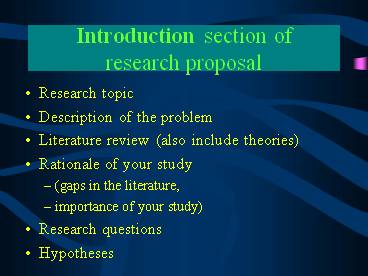Introduction section of research proposal - PowerPoint PPT Presentation
1 / 23
Title:
Introduction section of research proposal
Description:
Those with respiratory problems or at-risk of respiratory problems. How ... Bumper sticker: Question authority. Critically evaluate what you see, read, or hear ... – PowerPoint PPT presentation
Number of Views:73
Avg rating:3.0/5.0
Title: Introduction section of research proposal
1
Introduction section of research proposal
- Research topic
- Description of the problem
- Literature review (also include theories)
- Rationale of your study
- (gaps in the literature,
- importance of your study)
- Research questions
- Hypotheses
2
What is the problem?
- Who is affected?
- How are they affected?
- What is problem related to?
- What causes the problem?...
- Other issues related to problem
3
e.g. Smoking ban in restaurants
- Who is affected?
- Patrons of restaurants
- Staff of restaurants
- Owners of restaurants
- Smokers
- Non-smokers
- Those with respiratory problems or
at-risk of respiratory problems
4
How are they affected?
- Health consequences
- short term (respiratory illness, asthma
episodes, ...) - long term (cancer, emphysema, ...)
- Comfort
- Enjoyment of restaurant
- Economic effects on patronage
5
What is problem related to?
- Workers rights
- Non-smokers rights
- Smokers rights
- Tourism?
- Efforts to ban smoking from public spaces?
6
What causes the problem?...
- Second hand smoke
- components of smoke carbon monoxide, etc.
- Ventilation systems
- Etc.
7
Theory
- A statement of a relationship(s) that cannot be
directly observed. - Relationships between facts, clear constructs,
8
Uses of theory
- Describes relationships
- To explain data/ our observations
- Predict
- Organizes / Provides a framework to put into
perspective the knowledge, facts, impressions,
and suppositions we develop - Permits us to explain our activity to others
- Helps us to recognize gaps in knowledge.
- Generates new research and knowledge
9
Sociocultural Theory to understand body image
- Yet, this perspective doesnt explain...
- a) why some people are more susceptible to media
messages within a sociocultural context than
others - b) why some people seem to be happy with their
physical packaging even when it deviates from
cultural ideal - c) why some are dissatisfied with their bodies
even when they approximate cultural ideal
10
Theory to understand body image
- 1. Sociocultural perspective
- Try to explain these with cognitive approach
theories. - 2. Cognitive perspective
- Schema theory
- Self-discrepancy theory
- 3. Combination Rudd and Lennon (1994) model of
body aesthetics
11
- Induction
- Collect and analyze data Then create theory
after looking at the data - Deduction
- Select a theory and make hypothesis Then collect
data to see if it supports the theory or not
12
Choosing a research topic
- What is already known about this area?
- What are the unanswered questions in this area?
- Why is your study important?
- Is it interesting to you?
- Is it do-able? Can it be done over the next few
months?
13
Research Question
- A broad question your research tries to answer
- Research questions are How Why What
questions - (Avoid yes no questions)
- Ask a question that can be answered
- empirical question rather than metaphysicial one
14
Research questions are central
- Your entire research project revolves around the
research question. - Your study should be designed to answer the
question - (internal validity)
15
Research Hypotheses
- A research hypothesis is a prediction statement
of the outcome of a study - Educated guess
- Your research tries to find out whether your
hypothesis is supported or rejected - A hypothesis is a statement to which you can
answer with yes or no - No why how what questions
- Often describe the relationship between DV and IV
16
- Research questions
- How are traffic cameras impacting safety?
- How does the public feel the traffic cameras
affect their driving? - Hypotheses
- Drivers slam on their brakes when they see a
speed van on the road. - The speed cameras reduce the amount of speeding.
17
Homework due Jan. 23
- Homework 1 Due Thursday, Jan. 23
- Cozby pp. 19-30, 258-264, 271-276
- Bordens Abbott pp. 80-81, 91-92
- Leedy Ormrod, pp. 70, 74-89
- At least skim through the reading
- Think about topic for group project
- Select group project teams
- Homework 2 References Due Tues.Jan. 28
18
Philosophy of science
- What do we know?
- How do we know what we know?
19
Approaches to knowledge
- Religious
- Intuitive, new age, metaphysical
- Authority
- Rational
- Scientific (based on empirical data)
- Qualitative
- Constructivist (multiple realities)
- Critical consciousness - Marxist or
feminist filter (capitalist, sexist, racist
influences)
20
Scientific method
- 1. Observing a phenomenon
- 2. Forming tentative explanations or
statements of cause and effect - 3. Further observing or experimenting (or both)
to rule out alternative explanations - 4. Refining and retesting the explanations.
21
Skeptical?
- Look for scientific evidence
- Show me the data
- Look at the method
- How did they get these data?
- Dont just accept everything said by an authority
- Bumper sticker Question authority
- Critically evaluate what you see, read, or hear
- Think and be cautious about inferences /
assumptions about underlying causes made from
observable data
22
Scientific explanations
- Empirical
- based on data and observations - evidence of the
senses, objective and systematic observation - Testable
- Rational
- Parsimonious
- General
- Tentative
23
What is empirical research?
- Based on observations
- Direct observation what you actually
experience, e.g., Field research - Indirect observation what you hear from
people, e.g., Survey research - May use numerical data (quantitative) or words as
data (qualitative).































